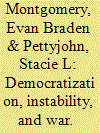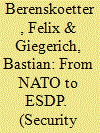|
|
|
Sort Order |
|
|
|
Items / Page
|
|
|
|
|
|
|
| Srl | Item |
| 1 |
ID:
098792


|
|
|
|
|
| Publication |
2010.
|
| Summary/Abstract |
In 2006 Israel resumed military operations in the Gaza Strip and conducted a war in Lebanon following attacks by Hamas and Hezbollah, respectively. Due to the elections that had recently taken place in the Palestinian territories and Lebanon, these events seem to support the argument that democratizing nations are particularly war-prone. Yet the dynamics this perspective identifies as dangerous were largely absent. To address this puzzle, this paper offers three arguments. First, democratization enhanced the power of groups openly hostile to Israel, increasing Israel's perception of threat. Second, democratization was threatening because it occurred within highly divided societies governed by weak state institutions that allowed radical groups to attain political power. Finally, Israel's response to the increased threat posed by these groups was ultimately counterproductive because it further eroded the capacity of the Palestinian and Lebanese governments, heightened polarization within both societies, and therefore exacerbated the same conditions that made democratization threatening to begin with.
|
|
|
|
|
|
|
|
|
|
|
|
|
|
|
|
| 2 |
ID:
098786


|
|
|
|
|
| Publication |
2010.
|
| Summary/Abstract |
This article addresses the question why Germany invested in what became the European Union's Security and Defense Policy (ESDP), a potential competitor to NATO. In addition to highlighting Germany's role in the development of ESDP, the paper offers a social constructivist explanation for this investment based on the concepts of friendship, estrangement, and emancipation. It develops the argument that (1) states gain ontological security by investing in international institutions to negotiate and pursue ideas of order with friends; (2) deep and enduring dissonance between friends signifies a process of estrangement and poses a threat to ontological security; and (3) if states cannot restore resonance with the old friend-institution configuration, they choose a strategy of emancipation by investing in an alternative. Applied to an analysis of German strategic adjustments between 1990 and 2009 in the context of U.S.-led interventions in Iraq, the Balkans, and Afghanistan, the article suggests that Germany invested in ESDP to offset enduring dissonance with the United States and NATO about appropriate mandate, missions, and means, with France and ESDP emerging as a suitable alternative. With this, the article offers valuable insights into the parameters guiding German security policy and the structure of transatlantic relations and also provides a theoretical alternative to the realist balancing proposition.
|
|
|
|
|
|
|
|
|
|
|
|
|
|
|
|
| 3 |
ID:
098794


|
|
|
| 4 |
ID:
098790


|
|
|
| 5 |
ID:
098784


|
|
|
|
|
| Publication |
2010.
|
| Summary/Abstract |
A significant and growing body of literature related to security regimes focuses on the importance of either common knowledge or common norms to the success of efforts to limit military competition. This paper challenges this central pillar of the arms control literature. Security regimes, in particular arms control regimes, are not necessarily the product of common knowledge, norms, or shared identities. Rather, actors can and sometimes do cooperate because they do not fully understand one another and lack information. In these cases, examples of what I will refer to as "imagined intersubjectivity"-the mistaken belief that two actors share information, norms, and identities when in fact each has an idiosyncratic understanding-the lack of information is crucial for international cooperation. I analyze the record of the Anti-Ballistic Missile (ABM) Treaty negotiations. Through process-tracing, I will argue that three crucial moments in the negotiation process were premised on a misunderstanding of the position of the other party. The implications for cooperation without intersubjectivity are then explored.
|
|
|
|
|
|
|
|
|
|
|
|
|
|
|
|
| 6 |
ID:
098788


|
|
|
|
|
| Publication |
2010.
|
| Summary/Abstract |
American national security policy is based on a misunderstanding about U.S. oil interests. Although oil is a vital commodity, potential supply disruptions are less worrisome than scholars, politicians, and pundits presume. This article identifies four adaptive mechanisms that together can compensate for almost all oil shocks, meaning that continuous supply to consumers will limit scarcity-induced price increases. The adaptive mechanisms are not particularly fragile and do not require tremendous foresight by either governments or economic actors. We illustrate these mechanisms at work using evidence from every major oil disruption since 1973. We then identify the small subset of disruptive events that would overwhelm these adaptive mechanisms and therefore seriously harm the United States. Finally, we analyze the utility of U.S. foreign military policy tools in addressing these threats. Our findings suggest that the United States can defend its key interests in the Persian Gulf-the world's most important oil-producing region-with a less-intrusive, "over the horizon" posture.
|
|
|
|
|
|
|
|
|
|
|
|
|
|
|
|
|
|
|
|
|